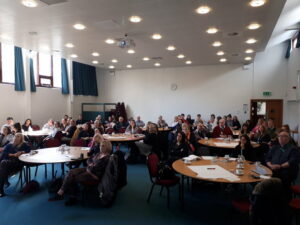
In November 2019 over 50 people from a wide range of organisations across Liverpool and Sefton gathered to discuss the impact of benefit changes on the food security of vulnerable people.
Sarah Jones and Sophia Gallagher from Mencap Liverpool & Sefton spoke about the connections between health, hunger and learning disabilities.
Ngaryan Li Senior Solicitor Vauxhall Law Centre spoke about Human Rights, the welfare system and the risk of hunger
The slides are available from both presentations:

Health, hunger and learning disabilities
Human Rights, the welfare system and the risk of hunger
Disability researcher Stef Benstead gave a powerful presentation about her experiences with the welfare system, highlighting the treatment of disabled people in austerity Britain.
Stef’s book Second Class Citizens is available to buy online
Watch our event video as participants offer reflections from their organisations and outline how they will respond to the event
What next?
The event generated several practical suggestions about how to improve the landscape of benefit changes for vulnerable people at both a local and national scale.
This event identified the need for Easy Read training – which was facilitated by Mencap Liverpool & Sefton in January 2020.
Please find below a summary of the other suggestions put forward at this event.
As you read through these suggestions, can you identify:
- One suggestion from the event that you could
pass onto someone in your organisation? - One suggestion that could impact on your own
practice? - One local issue raised in this document that you
are passionate about changing – how could you take a step towards doing this? - One national issue raised in this document that
you are passionate about changing – how could you take a step towards changing
this?
General
- Develop a culture in which people are treated equally
and with dignity and build institutions and systems that enable this. - Introduce more education and awareness raising
about learning disabilities from school onwards. - Look for opportunities for collaboration, such
as: sharing good practice; joint staff/ volunteer training;
collecting evidence that can be shared and used
for awareness raising and campaigning. - Utilise the strength of multi-agency provision
by organisations that have a good knowledge of their clients and their needs
and potential. - There is a need for more awareness of mental
health issues. - There is scope for more volunteers who could
offer online support.
Good practice for service providers
- Caseloads are very often too big which negatively
affects the service provided. - There is a need for greater continuity – staff
staying with a client throughout the process. - Training for workers and volunteers needs to lay
the basis for a person-centred approach. - Training also needs to include making clear the
range of potential partner organisations and ones to which people can be
referred, such as law centres. - Equality (and environmental) impact assessments
can help in the measurement of policy
effectiveness and conducting cost benefit analysis.Introduce customer/user forums and ensure they
are representative of the range of users.
Foodbanks and other food provision
- Often seem to be in competition – they need to
work better together and avoid duplication and food wastage. - May also need to provide updates on items
required, including sanitary products, nappies and toilet rolls. - Could provide recipes inside food parcels.
- Need to go beyond crisis food provision to
develop co-ops, food markets and growing schemes that can help build resilience
and self-respect.
Administrative changes in the benefits system
- Provide a more welcoming environment and
reception services in job centres and include on-site advocacy and more help to
guide claimants through procedures. - Make specialist/vulnerable people teams easier
to access. - Reduce waiting times on phone calls and call backs
– currently the length of time support staff spend on hold is hugely wasteful
and greatly reduces the number of clients they can help. - Rethink advocacy processes and especially the
authority to act for clients. (For example, needing to have them present is one
of the factors that makes the telephone waiting times so frustrating because,
if the client cannot wait, the call has to be abandoned altogether.) - In relation to access and use of the on-line
system, introduce more secure networks using public computers and reintroduce
telephone and personal claims. - Use plain English and make benefit letters
easy-to-read. - Stamp the envelopes of benefit letters with a
message indicating there is support inside to discourage them being thrown away
unopened.
Policy changes
- Restore direct payment of housing benefit to
landlords. - Return to payments being made more frequently.
- Reduce the five weeks wait for UC advance
payment, which leads to debt. - Include free school meals in Universal Credit
and find ways of reducing the stigma of free school meals. - Why is Council Tax not part of UC?
- Treating benefit recipients as individuals (i.e.
not couples /family assessments) would be simpler and encourage stability in
relationships.
Feeding Liverpool’s Role
- Events such as this one help to raise awareness
about: the range of organisations that offer support in
this area; the scope for partnership and/or referrals; What works and what doesn’t work. - Feeding Liverpool can use its website, social media and other
forms of communication to help: dispel myths about poverty and the benefits
system; provide a channel for collecting evidence and
stories.
Join our mailing list to stay up to date with how we continue to take the outputs of this event forwards.
